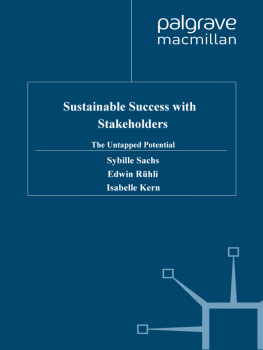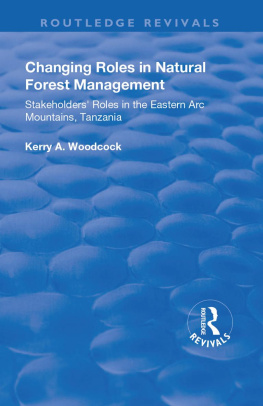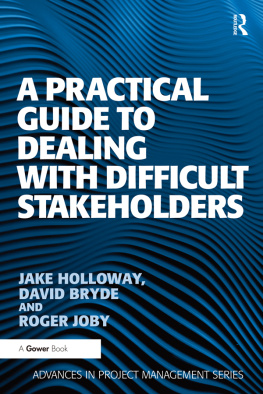Sustainable Success with Stakeholders
The business model of the pharmaceutical industry is on the test. In the future, only corporations will be successful who are able to implement the strategic management approach Stakeholder View in a visible and measurable way.
Dr Petra Danielsohn-Weil, CEO and President Pfizer AG, Switzerland
Communication is not just Oranges core business but also the most important prerequisite for a successful management. Since its foundation, Orange has greatly valued the constant dialogue with all its stakeholders and has therefore gladly agreed to participate in the case study of the authors Sachs, Rhli and Kern. The new book presents a profound analysis of how stakeholder dialogues are set up in firms and the impact which they have. The book contains valuable tips on how to establish and maintain a sustainable dialogue. Congratulations on this work!
Andreas S. Wetter, CEO Orange Switzerland
The sustainable success of Swiss Res business is based on knowledge about its different stakeholder groups such as employees, customers, experts and other partners. Based on global activities in different cultural contexts, the strategic relevance of stakeholders will further increase for Swiss Re.
Charlotte A. Gubler, Member of the Executive Board, Swiss Re
Sustainable Success with Stakeholders
The Untapped Potential
Sybille Sachs
Edwin Rhli
and
Isabelle Kern


Sybille Sachs, Edwin Rhli and Isabelle Kern 2009
Foreword Gilbert Lenssen 2009
All rights reserved. No reproduction, copy or transmission of this publication may be made without written permission.
No portion of this publication may be reproduced, copied or transmitted save with written permission or in accordance with the provisions of the Copyright, Designs and Patents Act 1988, or under the terms of any licence permitting limited copying issued by the Copyright Licensing Agency, Saffron House, 610 Kirby Street, London EC1N 8TS.
Any person who does any unauthorized act in relation to this publication may be liable to criminal prosecution and civil claims for damages.
The authors have asserted their rights to be identified as the authors of this work in accordance with the Copyright, Designs and Patents Act 1988.
First published 2009 by
PALGRAVE MACMILLAN
Palgrave Macmillan in the UK is an imprint of Macmillan Publishers Limited, registered in England, company number 785998, of Houndmills, Basingstoke, Hampshire RG21 6XS.
Palgrave Macmillan in the US is a division of St Martins Press LLC, 175 Fifth Avenue, New York, NY 10010.
Palgrave Macmillan is the global academic imprint of the above companies and has companies and representatives throughout the world.
Palgrave and Macmillan are registered trademarks in the United States, the United Kingdom, Europe and other countries.
ISBN 9780230229174
This book is printed on paper suitable for recycling and made from fully managed and sustained forest sources. Logging, pulping and manufacturing processes are expected to conform to the environmental regulations of the country of origin.
A catalogue record for this book is available from the British Library.
A catalog record for this book is available from the Library of Congress.
10 9 8 7 6 5 4 3 2 1
18 17 16 15 14 13 12 11 10 09
Printed and bound in Great Britain by
CPI Antony Rowe, Chippenham and Eastbourne
List of Figures
List of Tables
Abbreviations
ARPU | Average Revenue Per User |
CBG | Coordination Against BAYER Hazards |
CSR | Corporate Social Responsibility |
CRM | Customer Relationship Management |
EBITDA | Earnings Before Interest, Taxes, Depreciation and Amortization |
EFQM | European Foundation for Quality Management |
EIRO | European Industrial Relations Observatory |
EITI | Extractive Industries Transparency Initiative |
ESG | Environmental, Societal and Governance |
GEO | Global Equity Organization |
GPA | Group Public Affairs |
HMO | Health Maintenance Organization |
HRM | Human Resources Management |
IFC | International Finance Corporation |
IPCC | Intergovernmental Panel on Climate Change |
ISS | Institutional Shareholder Services |
MbO | Management by Objectives |
MOSOP | Movement for the Survival of Ogoni People |
NYSE | New York Stock Exchange |
NGO | Non-governmental organization |
OECD | Organisation for Economic Co-operation and Development |
PRI | Principles for Responsible Investment |
ROI | Return on Investment |
SMS | Short Message Service |
SRI | Socially Responsible Investing |
TDC | Tele Danmark Communications |
UNEP | United Nations Environment Programme |
VHS | Video Home System |
WMO | World Meteorological Organization |
ZKB | Zrcher Kantonalbank (Zrich Cantonal Bank) |
Acknowledgements
In writing this book several stakeholders have made substantial contributions. First of all, we would like to thank the University of Applied Sciences in Business Administration, Zrich (HWZ). We would particularly like to thank its principal, Professor Jacques Bischoff, who has always supported us financially and who always showed trust in and appreciation of our research. We are also grateful to Urs Marti, Delegate of the Board of Directors of HWZ, who has always supported us in our research projects.
A special thanks goes to Christine Luisi, who translated the German version of this book into English. She did it with great commitment, expert knowledge and patience when the authors introduced new phrasings that needed to be converted into proper English.
We are also grateful to Magi Wechsler, who succeeded in transforming a somewhat dry text into witty cartoons that summarize the contents of the chapters in a few pointed strokes.
We would also like to thank EABIS for supporting the publication of this book and for its cooperation during the past years.
All these stakeholder relations are proof of how fruitful and enriching the contribution of our stakeholders knowledge and experience can be for value creation.
SYBILLE SACHS
EDWIN RHLI
ISABELLE KERN
Foreword
Within EABIS (European Academy for Business in Society), stakeholders have always been identified as an important theme, both for the multinational companies and leading business schools in our network. As a result, in 2005, the Corporate Founding Partners of EABIS IBM, Johnson & Johnson, Microsoft, Shell and Unilever agreed to co-fund the HWZ-led project behind this book as one of their first priority initiatives.
Next page











